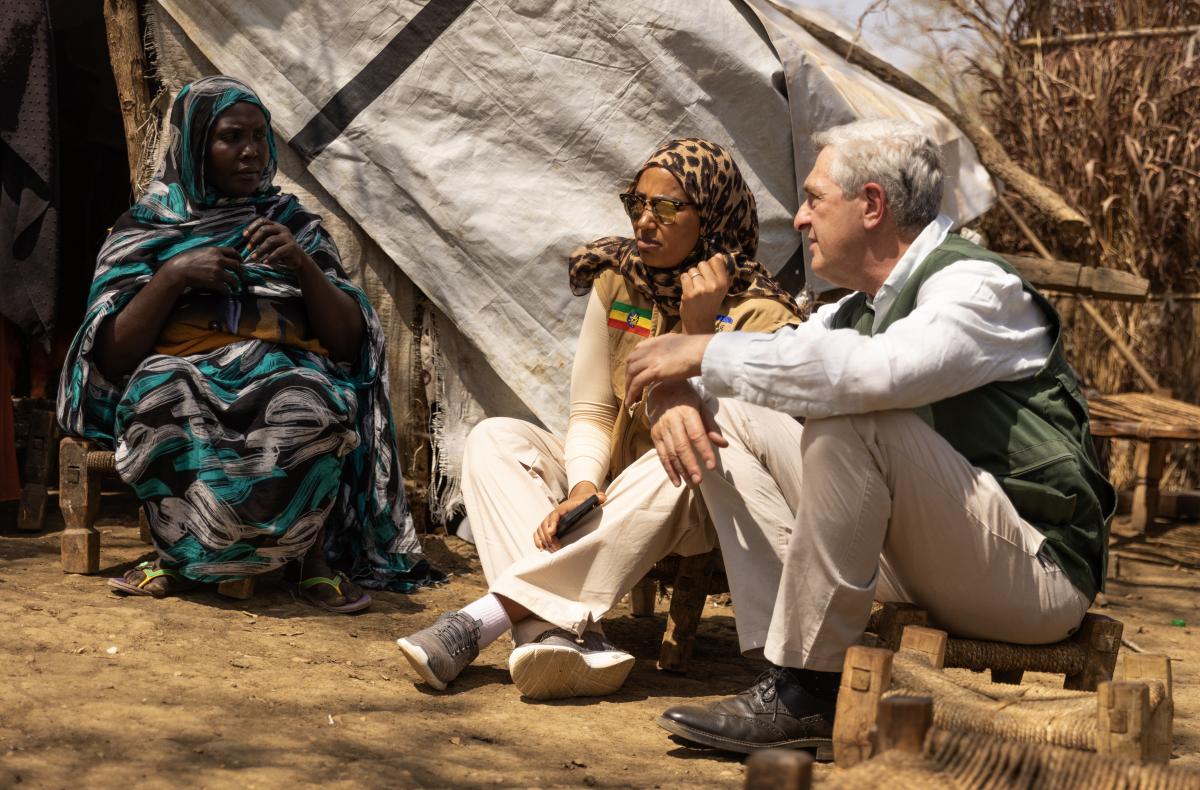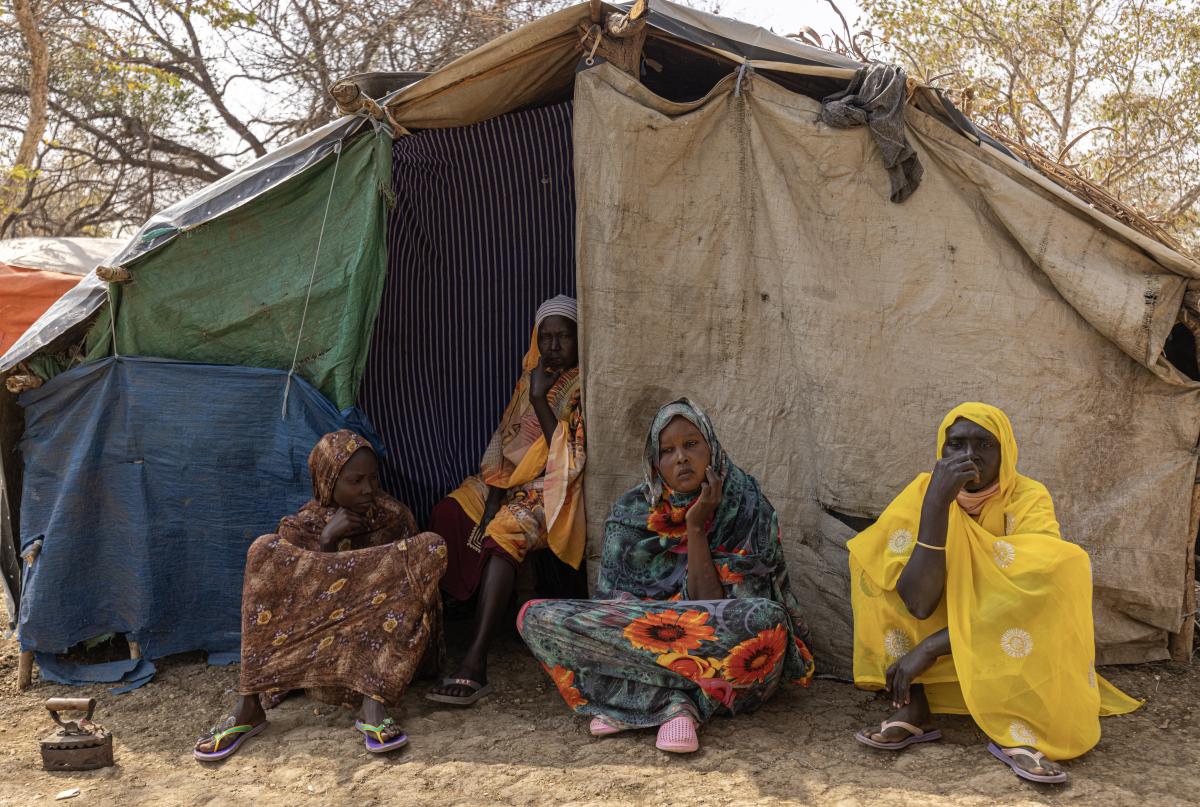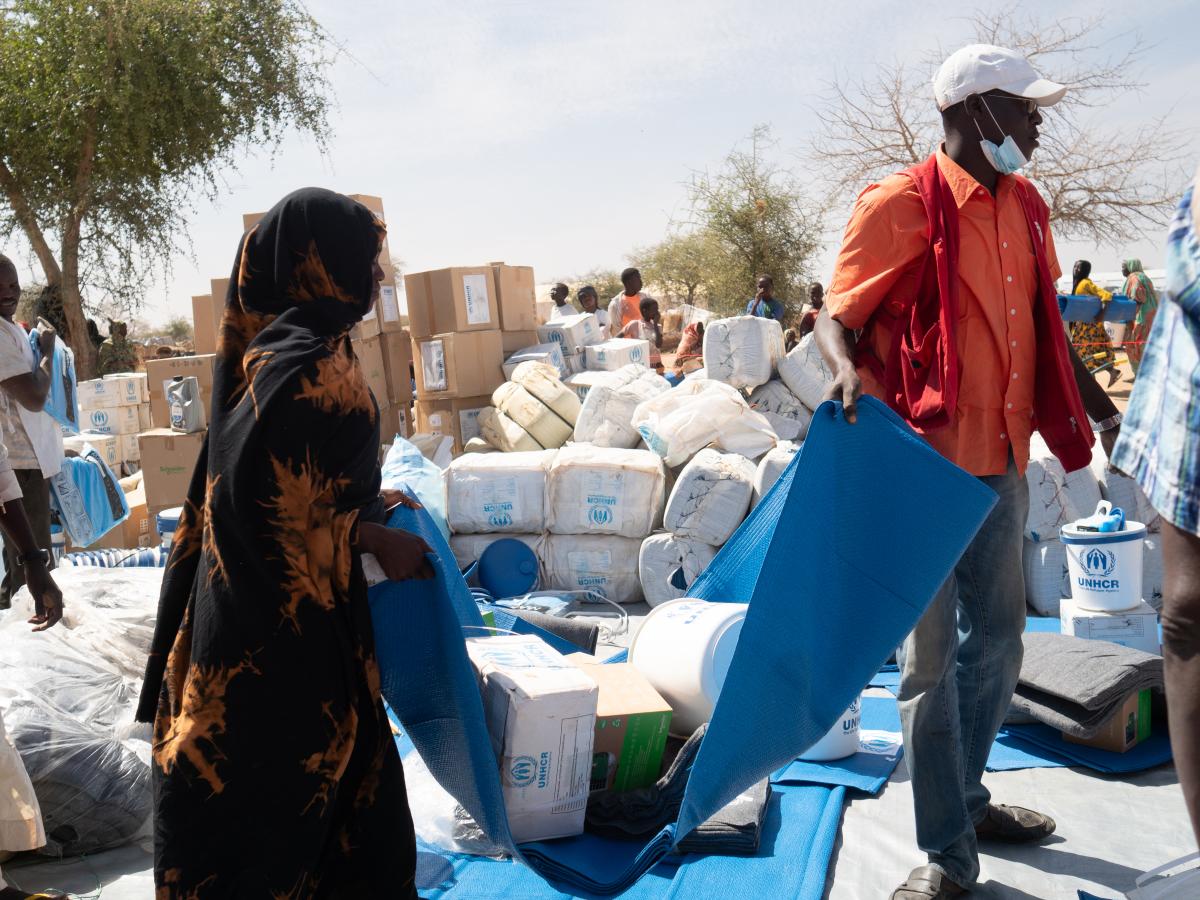8.5 million people have been displaced, since the conflict in Sudan broke on April 15th 2023. This is almost the entire Swiss population. Most of the people had to look for a new place within the country, but 1.8 million have also fled to neighbouring countries. UNHCR is on the ground to help all these refugees and displaced people. But resources are very scarce and the teams have to make difficult decisions...
Dr. Mamadou Dian Balde is UNHCR's Regional Director for East and Horn of Africa and Great Lakes and the Regional Refugee Coordinator for the Sudan Situation. He answered our questions.
Mamadou, have you been to Sudan recently?
Since this conflict started, I have been to Sudan twice. At the end of August, I went to the east, to Kassala, then I moved to Gedaref where many Ethiopian and Eritrean refugees are gathered, as well as the refugees who have been forced to flee Khartoum. I went to Wad Madani, which is three hours from Khartoum, where a lot of Sudanese which have been displaced several times, mostly from Khartoum, are now located. The population of Wad Madani doubled. I then followed the refugees into Kosti, on the way to South Sudan. Kosti hosts quite a lot of refugees from South Sudan. Then I met the High Commissioner for Refugees, Filippo Grandi, in the White Nile region.
More recently, in February, I went to Sudan again with the High Commissioner. We started in Ethiopia and went to the border with Sudan, in the Blue Nile region. There we met refugees affected by the conflicts, including Syrians, Ethiopians, Eritreans and Sudanese who have been displaced three to four times from Khartoum and who are very anxious about the future.
I had worked in Sudan before over 20 years ago as an Associate Protection Officer. I remember the Sudanese people as very proud and generous, who give and give and now it is heartbreaking for me to see a country where they find themselves as people who are in need and not even openly, because they keep all the challenges to themselves.
What is the current situation of the forcibly displaced?
Sudan was already hosting over 1 million refugees from Ethiopia, Eritrea, South-Sudan and Central African Republic before the conflict. Those refugees have now been displaced two, three, four times within Sudan, others have gone back to their country of origin. Those within Sudan need great support in terms of logistics, food and protection.
I, for example, met this tailor in August, who had a business in Khartoum. He had been in Sudan for more than three decades now and had built his own business. He was taking care of his two daughters - but after the conflict, he found himself in the outskirts of Wad Madani, three hours from Khartoum, with absolutely nothing. I also met a former engineer, originally from Darfur, retired. He had been able to have a nice life that he built for himself. He had a home for his family in Khartoum. Everything has been destroyed. He found himself with his children and grandchildren in a two-bedroom apartment that costs over 1,000 USD.
While I was in Kassala, I met a young medical student from Khartoum in one of the sites for displaced families known as a gathering site. Again heartbreaking, because she can no longer continue with her degree and doesn’t know what to do. Our team supports her and pays for her final exams for this year, but what will happen next year? That is the type of stories we hear within Sudan. Nearly all the Sudanese children can no longer attend school. They have lost one academic year already and there is a good chance they will lose another.
And there are 1.8 million people that have left Sudan. They find themselves in Chad, where in many areas the refugees outnumber the population of the host communities. They come on top of people who fled 20 years ago after the first crisis in Darfur. The situation in Chad is very difficult: Many are survivors of gender-based violence, lots of people don’t have access to healthcare or other services because of the lack of funding. In Egypt, thousands of refugees are hosted in urban areas, and services are overstretched, even though Egyptian authorities are doing their best to help. We support the most vulnerable refugees with cash-assistance there. Hundreds of thousands of people went to South Sudan – over 600,000 people both South Sudanese returning to a place they have never known after being in Sudan for decades and refugees. More have fled to Ethiopia and Central African Republic.
How exactly can UNHCR help all these people?
UNHCR, at the heart and the peak of the crisis, has stayed and has delivered. The teams have never left Sudan and its neighbouring countries and will never leave. That was the assurance the High Commissioner gave to all our partners: “We will stay, we will provide protection and assistance despite all the challenges we face.”
In addition to the direct support, UNHCR is advocating for access and less bureaucratic impediments so we can reach as many people as possible. We advocate for peace and ceasefire, so that people can go home. We also advocate outside of Sudan, so that other countries keep their borders open. Recently I was in Uganda where 30,000 people from Sudan have now found protection. Uganda is a new hosting country for Sudanese refugees as the conflict continues.


In Switzerland, media do not talk a lot about Sudan. Swiss people don’t know much about the situation. What would you like to tell them, so they understand why their help is so important?
Switzerland isn’t aware of the fact that Sudan was a major host of several thousands of Eritrean refugees. But the Swiss people probably know that Eritrea is the country of origin with the most recognized refugees in Switzerland. So, by supporting Sudan, they also support the Eritrean refugees. Sudan is so central to the stability of the region. And Switzerland is so central in educating people about the refugee cause. It has hosted the Global Refugee Forum. Let’s not forget about that.
I talked about the tailor, the engineer. It is the whole of society that has been displaced. They want the same thing as people in Switzerland: They want to do their jobs, they want to support their families. They are just like us, it’s just that they are now facing a situation that they didn’t ask for. They were caught in the conflict and now they are trying to establish themselves and do what is best for their families.
What can’t you do because of the lack of funds? What does it mean in the field?
In South Sudan at the border with Sudan we face challenges in reallocating refugees into safe areas. In Chad, it is even worse. There are thousands of people that cannot be reallocated to a safe place where they can live in a more durable shelter, a tent or have sufficient access to water and food. Another one is the protection services. It is about people being provided with a minimum set of services that will not lead them to risky behaviours to take care of their family. And if we cannot provide people with that minimum protection, that is a big threat.

Mamadou, you face a lot of sad things. What personally keeps you going?
The fact that we are making a difference in peoples’ lives. Even though our financial and human resources capacities are limited. When I go to the field and speak to teachers, students, former civil servants, I can see the difference we are making. That keeps me going. The level of frustration is of course extremely high, the financial resources do not come as they should, but we see the solidarity and all the good things we are able to do. That keeps us staying hopeful and addressing challenges.
How does the staff feel in that situation?
I think the value they add makes them proud. Being able make a difference in people's lives. But I know they also feel anxiety. They put in so much effort in their work. This situation also forces them to make really difficult choices: Who do I choose not to help? What do I choose not to do? This is hard for all of us. That is why we need regular and stable donors, so that we can plan and reduce that level of anxiety of our staff.
Thank you very much, Mamadou.
You too can make a difference for those displaced by the conflict in Sudan. Thanks to your donation, UNHCR can support these people and give them hope for the future.
Click here to find out more about the crisis in Sudan.